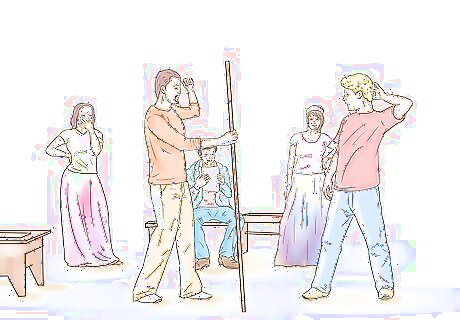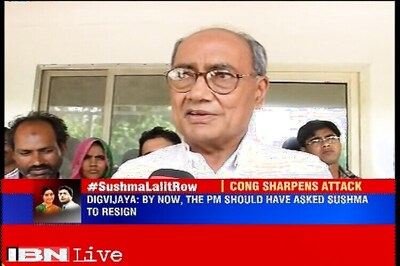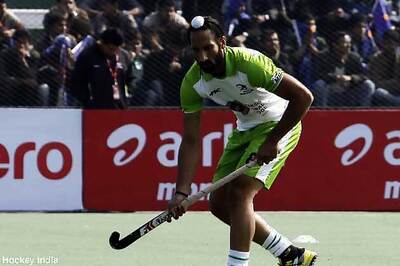
views
Organizing the Participants

Run auditions. You are now at the point where you have to choose who will be on your cast. This can be a difficult choice, either because you have too few good actors or too many. In case of the former, you will have to spend a lot of rehearsal time improving their acting; in case of the latter, you simply have a luxury problem with the downside that some of the actors may sulk a bit because they wanted a bigger part and could have handled one well. At moments like that, it would be a good idea to remind those who are sulking that they are good actors but that your word is final. This is a direct mode of address and can be considered as rather rude, but when carried off gracefully you can earn the respect of your actors by being honest. When you hold auditions, be sure to keep a weather eye open for chemistry between certain actors. You can benefit from casting them in roles that require them to be on stage together a lot both physically and verbally.

Organize rehearsals. Once you finally start rehearsing, it is important to first explain your rules and how you work to your cast. Some of them may have only had one director prior to working with you and are used to a certain modus operandi. Be clear from the start that you have a certain method by which you work and that there are certain rules. Preferably, those rules are simple. For example: the actors are not allowed to speak during concentration exercises. Though this may seem obvious, it may sometimes happen that you have an excitable group to work with. For such a group, keeping a tight ship could be beneficial. It also shows that you take your part in the production seriously, which gains you some extra respect. If you are working with inexperienced actors, organising other activities such as a rehearsal camp or some evenings out together could be very beneficial to both you and the cast. You get to know them a little better and, engaging in pleasant conversation, they find out that you're not the Bogart they may have believed you were. It also allows your actors to get to know each other in an environment that doesn't involve them being focused. Make sure your production manager is present at most, if not all, rehearsals. They need to know about the props you need in a timely fashion so they can arrange for them to be there when your production is ready to hit the theatres. At the beginning of each rehearsal, have your actors do some concentration exercises. It will get them focused on the work that lies ahead of them. next to concentration exercises, vocal and physical exercises are also very useful as a warm-up.

Consider your approach to directing. For example, before each scene, tell the actors what you want to see them do. This will prevent an endless quest through various different approaches while you are trying to figure out which one you prefer. Of course, this is a style of directing that may not suit everyone. A production can also greatly benefit from experimentation. In the end, it depends on the type of play you're working on and the actors you're working with as well as personal preference. At the end of the scene, give general comments concerning blocking, missed lines or things proceeding too slow or too fast. Give each actor individual comments after they have done a scene, possibly concerning their body language or the way they interact with the other actors on stage. Once you've done that, give the actors who are not in the scene a chance to speak their minds. They are your extra eyes and ears and they may spot something you have missed.
The Performance

Once the time has finally arrived for your production to hit the stage, tensions may run high. This can be between you and members of your cast, or cast members among themselves or production crew having issues with the way people are treating the props. You must make sure that you give everybody a big thumbs up and a pep-talk when they need it. This is when you truly show what you are made of. A good director will be supportive and professional even at times of great stress, and performance-nights are part of those times. Remain calm and in control. It is okay to vent after the performances are over but definitely not before or during. Even if things go wrong during the dress-rehearsal, show the people around you that you have rock-solid faith in them. It will make them feel better and therefore work better. All will benefit from this.

Practice the bowing at the end the performance with your actors. Especially if they are new to the stage, make sure that you establish an order of who goes on stage first and who follows who. Also make sure that the person in the middle thinks of a signal to start the bow, such as squeezing the hands of the two people who are standing next to him, who then pass this on so that everybody knows it is time to bow. It would be sad to end the play with a sloppy bow. You will only join them in this ritual at the end of the final performance.
After the Show

When a performance is over, congratulate everyone on a job well done. This is especially important when it's the last performance. Compliment your actors, production crew and technicians on the good work they did. Either before or after you do this, talk to the audience to find out what they thought. After all, they are the people you are communicating with. They can provide you with insights that you had not thought of and that will enrich the next performance.

Pass on constructive feedback. When advice given to you from your audience is worthwhile, tell your actors about it. Particularly if your production has multiple performances, this is useful to both you and them. Make sure everyone arrives in a timely fashion before the next performance so that you can go over the various scenes with them and tell them what went well and what did not. A production is a learning process for all involved and no two performances are the same. Audiences differ each night, and things that work well one night may not get the same feedback from the audience another night. This does not mean that they are bad things, it is merely a matter of audience dynamics: some audiences just prefer physical action while other prefer verbal sparring.

Start something new. Now that you are done with this production it is time to start thinking about the future. If you're lucky, you've found some time to network or someone who saw your play wishes to hire you for a project they are financing. If you're not lucky, the cycle starts all over again or you end up without a project. Make sure, therefore, that every production you direct is one you support fully. That way, there are no regrets and you can look back fondly on the work you did, no matter how small or amateur the production.



















Comments
0 comment